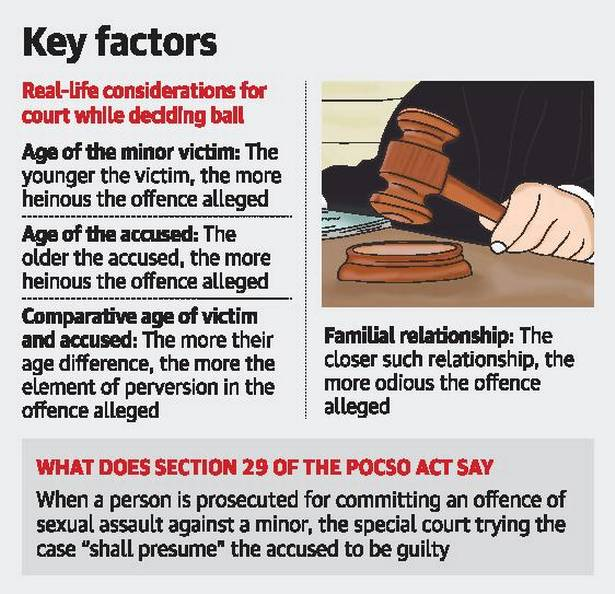Social Justice
Section 29 of the POCSO Act
- 05 Oct 2020
- 5 min read
Why in News
Recently, the Delhi High Court has ruled that the presumption of guilt engrafted in Section 29 of the Protection of Children from Sexual Offences (POCSO) Act, 2012 gets triggered and applies only once the trial begins, that is after charges are framed against the accused.
Key Points
- Section 29 of the POCSO Act:
- It says that when a person is prosecuted for committing an offence of sexual assault against a minor, the special court trying the case “shall presume” the accused to be guilty.
- Background:
- The question of whether the presumption of guilt applies only at the stage of trial or does it also apply when a bail plea is being considered cropped up while hearing the bail plea of a 24-year-old man arrested for alleged sexual assault of a minor.
- Rulings:
- It was clarified that if a bail plea is being considered before charges have been framed, Section 29 has no application.
- ‘Trial’ commences when charges are framed against an accused and not before that.
- Only at the stage when charges are framed does the court apply its judicial mind to whether there is enough evidence on record to frame a precise allegation, which the accused must answer.
- The Court held that an accused cannot be asked to disprove their guilt even before the foundational allegations with supporting evidence that suggests guilt are placed by the prosecution before the court.
- It is only once charges are framed that the accused know exactly what they are alleged to be guilty of; and therefore, what guilt they are required to rebut (deny).
- It would be disgraceful to fundamental criminal jurisprudence to ask the accused to disclose their defence; or, worse still, to present evidence in their defence even before the prosecution has marshalled its evidence.
- Earlier, the reverse burden on the accused to prove his innocence was incorporated in the POCSO Act keeping in view the low conviction rate of sexual offences against children.
- Reverse burden means that persons charged with an offence would have to rebut the presumption against them and the burden of proof would lie on them to show that they have not committed the act constituting an offence.
- The Court also set out fresh norms while deciding a bail plea at the post-charge stage. It held that in addition to the nature and quality of the evidence before it, the court would also factor in certain real-life considerations.
- These include whether the offence alleged involved threat, intimidation, violence or brutality. Also, the court, hearing the bail would consider whether the offence was repeated against the victim.
- It was clarified that if a bail plea is being considered before charges have been framed, Section 29 has no application.
Protection of Children from Sexual Offences Act, 2012
- It was enacted to protect the children from offences of sexual assault, sexual harassment and pornography with due regard for safeguarding the interest and well-being of children.
- It defines a child as any person below eighteen years of age and regards the best interests and welfare of the child as a matter of paramount importance at every stage, to ensure the healthy physical, emotional, intellectual and social development of the child.
- It defines different forms of sexual abuse, including penetrative and non-penetrative assault, as well as sexual harassment and pornography.
- It deems a sexual assault to be “aggravated” under certain circumstances, such as when the abused child is mentally ill or when the abuse is committed by a person in a position of trust or authority like a family member, police officer, teacher, or doctor.
- It also casts the police in the role of child protectors during the investigative process.
- The Act stipulates that a case of child sexual abuse must be disposed of within one year from the date the offence is reported.
- It was amended in August 2019 to provide more stringent punishment, including the death penalty, for sexual crimes against children.





